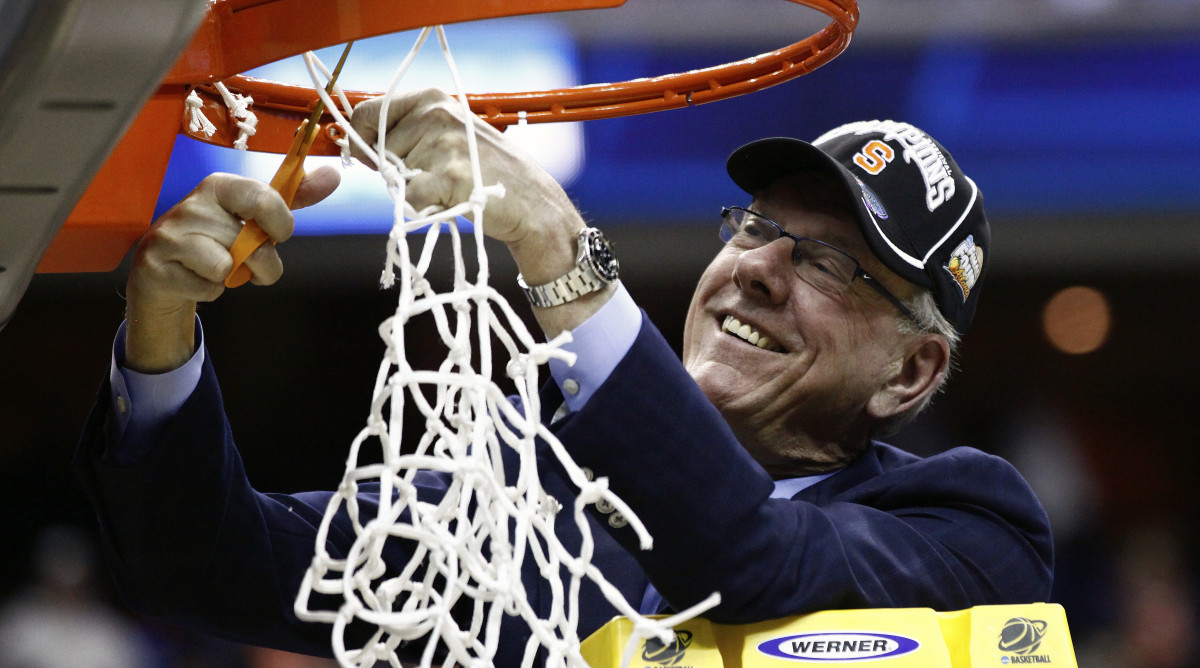Syracuse Stalwart: Jim Boeheim Retires as the Ultimate Loyalist

As the victories accumulated over the years, Jim Boeheim could have had almost any job in college basketball. He only wanted one. The job he already had.
Syracuse, N.Y., isn’t for everyone, but it was Paris for Boeheim. It was Maui. It was his own Greek island. Even if paradise came with piles of snow and leaden skies, they so perfectly matched the coach’s eternally gloomy countenance.
Spend a lifetime there? He couldn’t dream of going anywhere else. In a transient sport, Boeheim gave Syracuse an incredible gift of permanence.
At age 78, after 60 continuous years with Syracuse basketball—the last 47 as head coach—Boeheim retired Wednesday. There was conjecture during this disappointing, 17–15 season that he would hang it up, and even after he swatted that away in a February interview with ESPN, the whispers never stopped. Word finally came out after the Orange were eliminated in the Atlantic Coast Conference tournament that he was done. Boeheim announced it without really announcing it in the postgame interview session, unwilling to the end to play ball with the press.
He’s the second-winningest coach in Division I men’s basketball history, behind only Mike Krzyzewski, but this seismic development in the sport was past due. Boeheim’s own stubbornness was enabled by an administration that cowered in his presence and let him continue as coach/emperor through myriad scandals. But this isn’t a day for kicking Boeheim in the backside on the way out the door; it’s a day for appreciating the ultimate fixture in American sports history.

The only comparable championship-level college coach so integrally intertwined with a school was Joe Paterno at Penn State (and thank heavens this didn’t have to end like that did). Maybe Tom Izzo will get there at Michigan State, but he has a long way to go to match those two.
Paterno was head coach in State College, Pa., for 46 years, and an assistant before that for 15, but he wasn’t a student or native of the region the way Boeheim was of Syracuse. The place was his entire life, up to and including coaching his sons in recent years.
If it takes a bit of an iconoclast to hunker down in a place many would want no part of, that role snugly fits Boeheim. Often funny and good company in private, he rarely let that side creep into his public persona. If the world saw him as a scowling sideline presence, he didn’t feel compelled to change the narrative.
An utter hoops junkie, all he really wanted to do was coach ball—and he did that extraordinarily well. Five Final Fours and one national title headline the list of accomplishments, but don’t overlook the streak of 45 straight winning seasons—put an asterisk on the ones where the NCAA vacated victories as sanctions for rules violations—that ended last year. The consistency was unshakable.
Boeheim was as tightly tied to a style of play—primarily the 2-3 zone defense—as anyone in the history of the sport. It was more than a calling card; it was a way of life. It worked so well that decades after his former assistant coach, Rick Pitino, became a star in his own right, he adapted the zone and won the 2013 national title (since vacated) playing it.
Boeheim’s basketball acumen not only led him to the top of the college game, it earned him an assistant coaching role to Krzyzewski with the 2008, ’12 and ’16 U.S. Olympic gold medal teams. That was more proof that Boeheim could have coached at any level of the sport and been a big winner.
But he knew where he fit, and never wanted to change that comfort level. Syracuse was an accomplished program before Boeheim became the head coach; he simply took the program up a few levels. Upgrading from creaky Manley Field House to the massive Carrier Dome, he made the Orange bigger. Moving from the East Coast Athletic Conference to the Big East, he helped energize a fledgling league that would become a 1980s phenomenon.
You cannot tell the story of the Big East without the stories of Boeheim vs. John Thompson, Boeheim vs. Jim Calhoun, Boeheim vs. the world. Alas, you also cannot tell the story of the Big East’s realignment identity crisis without Syracuse leaving the conference for the ACC, a move which hit Boeheim in the gut.
Boeheim never achieved the same level of success in the ACC that he enjoyed in the Big East, finishing just 12 games above .500 in league play in 10 seasons (and much of that came in the first year, 2013-14). The ‘Cuse crashed the Final Four as a long-shot No. 10 seed in 2016, riding the zone voodoo, but Syracuse has spent more of the last decade as a bubble team than a national title contender. Lately, it hasn’t even been that; this is the second straight season the Orange wasn’t close to earning a bid.
Given the program’s downturn, the decision to replace Boeheim with one of his current assistants, Adrian Autry, is not without risk. This is very much the trend in what is very much a period of turnover in the sport, with Duke and North Carolina and Villanova all replacing legends with an inexperienced understudy.
It’s too early to tell whether that trend will work at Duke and Villanova. The two-year returns at North Carolina are cause for concern other than a magical six-week run last spring. It’s always hard to be the man who follows The Man, and nobody has been The Man longer than Boeheim.
After 60 years, he’s earned the right to spend a winter in the Florida sun playing golf. But he’d probably be more comfortable looking out his window at January snow drifts and March slush. That’s home for Jim Boeheim.
